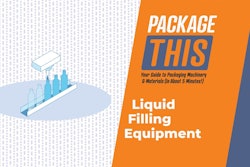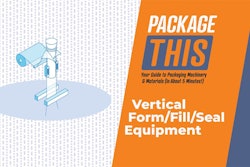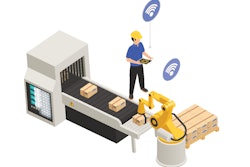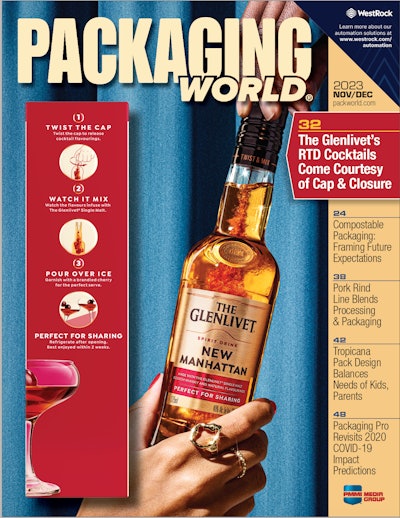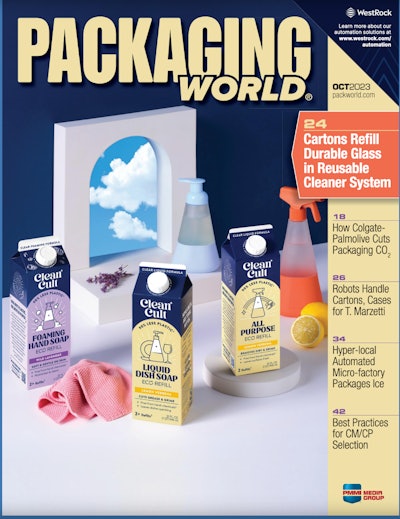On a special Packaging and Processing Women’s Leadership episode of unPACKed with PMMI, CPG Next Editor-in-Chief Stephanie Neil has the privilege of sitting down with the Baroness of Brewing Manjit Minhas. Minhas is a powerhouse entrepreneur, philanthropist, investor, and even a dragon on the hit Canadian TV show Dragons' Den. In their candid conversation, Neil delves into Minhas’s journey, from building a thriving business empire to navigating the intricacies of work-life integration. Minhas shares invaluable insights on negotiation, overcoming imposter syndrome, and finding the courage to take risks. But that's just the beginning. Neil also explores Minhas’s passion for STEM education, giving back to the community and reveals her secret to getting 1% smarter every day.
To subscribe, rate, review, and find more unPACKed podcast episodes, visit pmmi.org/podcast or find us on Apple Podcasts, Spotify, iHeart Radio, or wherever you listen to your podcasts.
Stephanie Neil:
Hi, Manjit, welcome to the podcast.
Manjit Minhas:
Hi. Thanks for having me.
Stephanie Neil:
It's so good to talk to you again. Last time we spoke, we were in Las Vegas at the Women's Leadership Network, and that breakfast went so well. And we can't recap everything that happened there, but I do want to start the conversation by kind of the first question that everybody always asks you. And it's about, how do you balance everything in such a busy world? And you, yourself, when you're a mom, you're a wife, you're a business owner, you're a philanthropist, an investor, an honorary lieutenant-colonel, the list goes on, you're a dragon on the very popular TV show, Dragons' Den. Do you have any tips for successfully balancing being in your personal life, as well as your work world?
Manjit Minhas:
First of all, I don't believe in work-life balance. I believe in work-life integration. I believe that, listen, we have a family life, in my case, I've been married for 16 years, I have two kids, have parents that are aging, in-laws that are aging, brother-in-laws, nieces, nephews, so a lot of other responsibilities. And then, the work side of things, 24 years ago, my brother and I started this company, and it was just him and I. And we're over a thousand people in 16 countries. And both of those parts of my life are very important, and I like to be present at both of them, but in different times. And I've gotten rid of the guilt. I don't feel guilty about the recitals and the birthdays that I don't get to, and I don't feel guilty about the meetings and the trips that I don't attend either.
I have a trusted team, and you got to trust them enough to be able to make the right decisions for what their roles are. And so, I think the first thing you got to let go is let go of the guilt and then, also, come to terms with the fact, just because you've become a mom or a wife or whatever that might be, that you still have ambitions and drives. None of that goes away, and I don't think that it's right to feel bad about the fact that you still want to do other things. And also that I truly believe that I'm happiest when I am fulfilled. And sometimes, that is all day work. Sometimes, that's all day play, and sometimes, it's a shitstorm of both of them, but it all works.
Stephanie Neil:
Sometimes it's hard for women to advocate for themselves. You can get rid of the guilt, and you can do the things that make you happy. Let's just put our work hat on. Do you have any tips about negotiating styles? If we're women in a man's world, in a male dominated industry, should we be emulating their negotiation styles?
Manjit Minhas:
No, not at all. I think that a part of this is that you have to understand what your boundaries are, what your non-negotiables are, what is important to you, and that's always the place to start for a successful negotiation. What you're willing to give up. There's always a sacrifice for both parties to have a win situation, a partnership, but also, for something to work. And you do have to be very clear with yourself, whether it be on the home front or whether it be at the office, as to what your boundaries and your non-negotiables are. What are you trying to achieve out of this negotiation and/or out of your day, out of your year? What are the goals here? And I truly believe, as more clear as you can be of those goals, you can not only communicate those, but you can achieve them. Because you're working towards something, and all of those around you, at home or in the office, need to be aware of what you're working towards.
You can't do it on your own, and nobody raises a successful company or a family on their own. And I think that women especially have to understand that, that you do have to ask for help and then, take it and understand that you aren't going to do it on your own and nobody does it on their own. I wear a lot of hats, absolutely. You named a couple, and I don't do any of those by myself. There literally is a team beside me, unpaid, paid, family, friends, a mixture of it all, in order for all of those things to work and to happen. But I will say, one thing I've gotten really good at is asking for help and then, actually, taking that help, whether it be driving to soccer practice and getting a meal on the table and/or getting a presentation done or whatever it might be, on both fronts. There is something has to be said for actually asking for help, but taking it too.
Stephanie Neil:
When someone's in the Dragons' Den, they're obviously asking for your help. What do you look for when somebody's pitching a product to you?
Manjit Minhas:
Yeah, so I've been a dragon on Dragons' Den for nine years now. Seen thousands of pitches, not only in the den, but everywhere I go. And I will say, first and foremost, it's about the entrepreneur. I'm looking to invest in entrepreneurs, that are coachable, that are resilient, because I've been around the block now a bit, I've been an investor for a while, to know that, listen, with the idea or the product or service that you're presenting to me in front of me right now, I guarantee you, in six months, 12 months, 18 months, it's not going to look the same, and it shouldn't.
And so what I need to know is that my money, my reputation, my time, my energy, not only of me, but all my team, is going to be well spent and it's going to be spent with an entrepreneur that wants to win, is going to work hard, is going to listen more than they talk, is going to actually be able to meet the challenges of the day. Because being an entrepreneur is hard. It's 350 tough days for those 15 days of glory in the year, and you want to be partners with somebody who you enjoy, but you also really feel is going to get through the ups and downs of being an entrepreneur, that isn't pie in the sky, isn't just a dreamer. I like dreamers, but I like doers better than I like dreamers.
Stephanie Neil:
You're an entrepreneur, but you have an engineering degree. You're in the spirits industry. A lot of the women listening to this podcast right now, men and women, are in the packaging industry, so they can identify with you. Have you used your engineering degree throughout your career?
Manjit Minhas:
I think, no matter what your education is, I think that you use it in a variety of different ways. It might not be a direct line, but you use those skills, which I think is the most important about any type of education. You use those skills, how to research, how to communicate, how to reach and be efficient and productive and get to deadlines. And it just gives you also a confidence that you actually have a background in something other than life. And so, I would say, no matter what your background is or your education is, whether it just be high school or whether it be an arts degree, in engineering, or even if you didn't finish, it really doesn't matter, I think what you get out of that is talent skills, gets also the way to network, which is really important, but also, through that process, you learn a lot about yourself. And I think that that is one of the most important things about any type of education.
Stephanie Neil:
So this is actually a good segue into a question that came from the audience when we were in Las Vegas, we couldn't get to them all, but I really like this question. And when you're talking about your education and your confidence, that's all well and good, but a lot of women still deal with imposter syndrome. And do you have any advice to help them overcome that?
Manjit Minhas:
I think you do have to acknowledge that it exists within you, but then, you have to also double down on what you're good at and why you feel you're good at it, what you've taken risks at, what you've succeeded at. But I'm not a believer in fake it till you make it. I think it's really important to try, fall down, get up again, learn, and retry. And you build confidence by actually taking risks and not fearing to be wrong, that you push through that fear and you're courageous and you choose being uncomfortable and push through that fear to get on the other side of it. You might not always succeed, but you will learn something along the way. I guarantee you will get tougher, and the next time you try it and you're trying to innovate or take another risk, you will get better at it.
It takes practice. Nobody is born with that skill that makes them take risks or not look back and not have imposter syndrome. We absolutely all do, but I think that it's really important to understand that you do have to be courageous and you can't let the fear stop you, that you don't know, of the unknown. The fear of the unknown, everybody has it, but you know what? You ask for help. You research. There's lots of places you can go to get consultants to give you advice. You can have mentors, you can have sponsors also help you. But it is something, yes, that you have to acknowledge, but you do have to focus on what you're good at and the positive, not the negative. You have to absolutely let that voice in your head that keeps telling you're not good enough, you have to push it down, and you have to push it down, in order to make sure that you can actually try some new things. And you'll be surprised at what you succeed at.
Stephanie Neil:
Yeah. You told some great stories about how you had to show some courage and push through some things. Do you have an example of maybe a setback that you experienced that taught you a big lesson?
Manjit Minhas:
No. I've had so many setbacks in my life, whether it be products that have failed, whether it be industries that we've tried, from the sporting goods industry to the wine business to... I could go on. I know, one day, I will write a big long book about failures, not successes, because I think that, not only do failures teach you a lot, but they also direct you into, "Not here. Okay, maybe take a right." And when you do get that success, you not only value it and nurture it more, but you've gotten there, as many people have, by actually trying and experimenting, innovating, putting yourself out there, doing the tough work, which everybody does, but not everybody talks about, when they're successful, which definitely irks me. Because nobody successes overnight. It does not happen overnight. But I can guarantee you one thing, if you quit, it won't happen at all.
Stephanie Neil:
Right. So one of the things that we're trying to do as an organization is to open the doors to a younger generation to come into this industry, and there's a lot of... We're trying to create a pathway for young girls to get into the STEM fields, the science, the technology, the engineering, math. I know that you have young girls yourself. Is there any advice or things that you think can make this field more interesting to young women, as they're choosing a career path?
Manjit Minhas:
I would say a couple things. One, they need to be exposed to it as early as you can. My girls, very young, they were sure doing art camps and gymnastic camps, but they were also doing engineering camps at the same time during the summer. So I think they need to be exposed to what STEM can actually be. It can be integrated with arts, it can be integrated with fashion, it can be integrated with gymnastics even. I tell my girls all the time how gymnastics is physics. In the beginning, they're always like, "What? You're geeky." And then, I'll be like, "No. Let me..." I think that you do have to find ways that integrates into their life, that they can understand how and where they can help make a difference.
I have a niece, for example, that is into STEM field, and she actually was like, "Wow, I never knew there was so much science actually and chemistry involved in making makeup." And I said, "Right." And she loves makeup, and she is totally all in. She's a chemistry phenom. And so, it's really interesting, I think, for young girls and women to really understand that how it can not only be a part of their daily lives and their career, but how many career opportunities there are with it and how they can actually affect their lives.
Stephanie Neil:
That's a really good point. I know that, also, giving back is a big part of your life and your story. You spend a lot of time and money and give to many charities. Why do you feel it's so important to give back, regardless of where you are on your career path or your life's journey?
Manjit Minhas:
I grew up, my parents are immigrants to Canada. They did not have an easy, not only beginning in this country, but they were able to give us a middle class upbringing. And it was important to me to not only help immigrants, girls, young kids, but also women who are discovering who and what they are. And then, as the generations go from my mom's generation to mine, to my daughters, what the opportunities are, and sometimes, you need help. And I'm able to shine a light on many of those things, the positives and the negatives. And I think that it has also given me a much more appreciation for, not only the struggles, but everybody's unique story.
I've met some amazing people that I call friends now through philanthropy, and I think that, when you're working for something bigger than you, but also understanding where need in your own community is, it's really quite rewarding, in so many different ways. But also, it helps us all get out of our bubble, no matter where that is, and out of our day-to-day routines. We're always, all of us, are all on the hamster wheel. And if we can break out of that to help somebody else at a moment in time, I think that that's really special. And I was always taught that values by my grandparents, and so I'm happy to be able to teach that to my kids too.
Stephanie Neil:
Manjit, you also have your own podcast, and I know you have a lot of great guests on there. And if someone were to ask me who my dream guest would be for a podcast, I would say you. So thank you for being here. Do you have somebody that you would love to interview?
Manjit Minhas:
Oh, I have lots of people. And I think that's the fun part, because you learn different things from different people, their journeys, most importantly, their struggles in life, their sacrifices. I don't usually like to talk about actually their successes. I really like to talk about their upbringing, their challenges, and how they ended up in a variety of different fields, that people do end up. And so, I think that we, as entrepreneurs in particular, we don't really talk about that as much, as to how you get somewhere. Yeah, there's lots of people, living and dead, that I would love to talk to, entrepreneurs, athletes, people who have sacrificed a lot in order to get to where they are today, to be the best at what they do, but also, enjoy it along the way. And yeah, I definitely have a dream list. And slowly, but surely, trying to get through it. But it is fascinating for me to learn from other people all the time.
Stephanie Neil:
I like that you brought up the learning aspect. One thing that you said, during our conversation back in Vegas, was it "Find a way to get 1% smarter every day?" Did I say that right? Or what's the theory behind that? Because I loved it.
Manjit Minhas:
Yeah, I've been on a mission for quite a while to be 1% smarter before I go to bed at night. And I do that in so many different ways. And the one way I do it consciously is that I have scheduled one hour in my calendar every single day, even on the weekends, that is just for me, is to read, to listen to podcasts, to think, to talk to people, to do a lot of different things, that help me become more knowledgeable about things that I'm interested in, things that I don't know anything about and/or enjoy. And I think that, more and more, there's so many things that we're all wondering about, that many people assume that everybody knows about, but if you don't take the time to actually do some research, to read, to take time away, rather than hearsay, and get other people's opinions on things, it's really hard to come to any table or any conversation armed with knowledge, but also, to find out what your interests are.
And that has been a really interesting and fascinating way that I go to bed thinking, "Okay, great. I just didn't do a bunch of check marks on a to-do list. I actually got an hour today that was me time." I will admit, sometimes, I nap during that me time [inaudible 00:15:47]. But it doesn't matter what is going on, it is time that everybody knows on my calendar that you can't bug me, unless the house is on fire. But even then, please think twice before you get ahold of me. And so, it is something that I think that everybody should really take time for. I take a lot of courses in that time. For example, I just finished a six month rigorous course on ESG, because I'm really fascinated.
I've always been fascinated with DEI, with ESG, with environmental things, not only in production and manufacturing, but in a variety of other ways. Because I sit on a fair number of boards, so how does environmental, social, and governance, and how is it being framed? What is the language being used today? I've read a bunch of books on it, but I decided, "You know what? Let me take an intensive course on it." And so, that was really fascinating for me. So I'm always trying to do something that makes me a bit smarter.
Stephanie Neil:
I don't know how you find the time. So my last question for you is, what is your next big adventure, either personally or professionally? What are you going to do next to amaze us?
Manjit Minhas:
I don't know. You know what? A lot of things in my life are because I'm open to the opportunities and those around me understand that I'm open to taking on new challenges and exploring and giving my knowledge and then, taking from them. Listen, it always has to be give and take for anything to be successful. And so, I don't know what's next, but stay tuned.
Stephanie Neil:
Excellent. We will. Thank you so much for your time today, Manjit. Always great to see you.
Manjit Minhas:
You too. Thank you.






